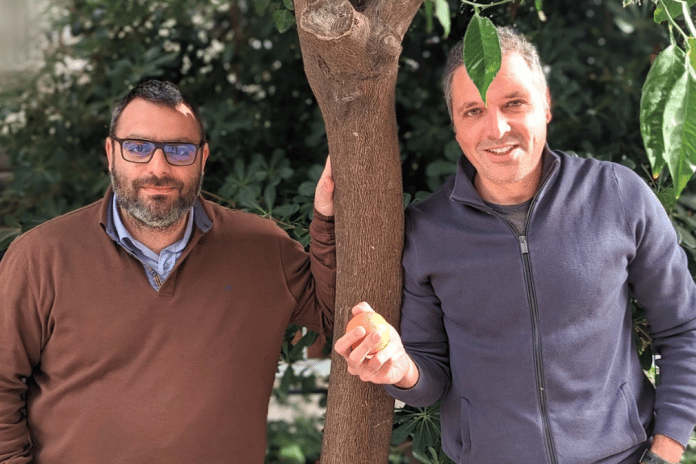Greek startup Wikifarmer is transforming agriculture. The direct farmer-to-business marketplace, which gives farmers access to fair business opportunities and educational tools, just secured €5 million. We take an inside look with founder Ilias Sousis.
The agricultural industry is one which impacts each and every one of us. Responsible to feed our growing and hungry population, agrifood players and farmers are tasked with sustaining a global food supply chain – from cultivation to harvest to distribution. The industry is the number one employer in the world and generates a total turnover of €1.2 trillion in Europe alone.
Despite this, a significant number of farmers still lack access to modern agricultural best practices and it’s one of the least digitised sectors. It’s also an industry under considerable pressure – our population is growing, the climate crisis is hitting crop cultivation, resources are scarce, the supply chain is being disrupted, there’s a growing need to adopt sustainable practices, and, farmers are financially struggling.
Headquartered in Athens, Wikifarmer is aiming to change this outlook – giving farmers a lifeline through digital tech and empowerment. Founded in 2017, the aim is to democratize agriculture by creating the leading B2B marketplace for agricultural products in Europe and becoming the leading source of free agricultural knowledge.
Wikifarmer’s Co-Founder and CEO, Ilias Sousis: “Our vision is to restructure the supply chain, digitize processes, and ultimately generate more value for all parties involved. Our mission is to become Europe’s leading B2B trading platform within the next two years. This round of funding will allow us to accelerate our product development in order to offer 360° coverage of agricultural transactions.”
The startup just secured €5 million of fresh investment in a round led by Point Nine. Different business angels also participated.
Petros Sagos, Co-Founder and Chief Science Officer: “Above all, we hope this funding will enable us to turn our long-standing vision into reality: democratize agriculture and support farmers in modernizing their techniques, selling their products, and earning the value they deserve.”
Wikifarmer’s platform supports farmers from start to finish. It enhances practices through its knowledge base and network, and then, enables farmers to make their business lives easier, more profitable and fairer.
It tackles both the supply and demand of agriculture On the supply side, it ensures farmers receive the value they deserve. They can produce more efficiently, sell directly, and enjoy an increase in their profitability by up to 300%- profitably which can be reinvested into employment and sustainability measures. For the demand side of things, the platform acts like a purchasing assistant for B2B buyers, such as wholesalers, larger hotels, restaurant chains, small and medium size retailers, or food processing units – giving hassle-free sourcing of quality agri products, the ability to negotiate prices fairly, logistics support and transaction transparency.
Wikifarmer was launched to connect fairer and more sustainable agricultural output with digital tech. The resulting marketplace is proving transformative for agriculture, creating better outcomes for previously over-burdened an neglected agrifood operators. Today, WIkifarmer has enabled thousands of businesses to reduce costs by up to 30% and the knowledge hub, dubbed the “Wikipedia of Farming” by the United Nations, is available in 16 languages.
We chatted with Ilias Sousis, Co-Founder and CEO to find out more:
Since launch, has Wkifarrmer’s goal changed? What are you setting out to achieve?
Our values and mission remain the same: to help farmers get more educated and more profitable as this will have a huge impact on the global economy and environmental sustainability. A farmer that is more educated on the latest farming techniques can produce more sustainably and with higher yields and if this is combined with selling his/her products at a higher margin, this means that these farmers will be able to re-invest the profits to their farms, hire people to develop technologies and next year achieve even better results.
How is Wikifarmer making the agrifood sector more sustainable?
A more profitable and educated producer is key to this equation. Agricultural technology can make production greener as it has a lot of benefits versus the old techniques, can help farmers have better predictability and of course allow them to scale their production much easier. All of that can create a much healthier ecosystem that will be avoiding malpractices and will have a great impact on the environment.
Farmers are under a lot of pressure. They are responsible for feeding the world but battling with low incomes, lack of support, climate disasters impacting yield – how do you support them? What else needs to be done?
We are trying to educate them so that they can produce more effectively and at the same time help them increase their income. Farmers produce the most valuable part of the value chain, but the majority of them still make the least profit out of it, so we are trying to change them by offering them access to our platform, promoting their products to thousands of buyers, helping them with logisitcs and offering them financing solutions.
What’s in store for 2023?
We will invest a lot in creating a digital platform that covers all the needs of buyers and farmers when it comes to agricultural transactions. Apart from investing in our product, we will also invest more in our international presence.
You’re based in Greece, how do you see the Greek startup ecosystem progressing?
I really believe that in the last 3-4 years some significant steps have been made as 1) the government created a more startup-friendly environment and gave a lot of incentives to attract a lot of talent in the country (digital nomads or expats) 2) we had some great successes of companies that start to inspire potential entrepreneurs make the leap and 3) more and more capital and most importantly expertise is coming to the country by foreign venture capitals, which will result to an even greater ecosystem in a few years.




